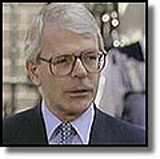
|
Cook Pledges Better Deal on EuropeLabour will get a better deal for Britain at next week's European summit than could have been achieved under Conservatives, Foreign Secretary Robin Cook has told the Commons.Mr Cook said that because the Government was no longer just "heckling from the sidelines" it would be listened to with respect. Other European leaders would know that when the new Government did say no on issues which threatened Britain's national interest at the Amsterdam summit and beyond, ministers really meant it. "For that reason we will get a better deal at Amsterdam than the Conservatives ever could," he said. With tough negotiations beforehand and hard bargaining at the summit, Mr Cook said he was confident that the Government could obtain a legal basis for maintaining Britain's external border controls. He was also hopeful of securing tougher provisions against fraud in other EU states and more votes for Britain and other large countries in the Council of Ministers and retaining the national veto over issues of common foreign and security policy. "In other words we can return from Amsterdam not just having done a deal, not just having done a good deal for Britain - but having obtained a better deal for Britain than the previous Government could have hoped to achieve." Opening a debate on the EU ahead of the summit, Mr Cook again stressed that the Government would not sign-up to a European single currency if the entry criteria were fudged and indicated that ministers had only a few months left before deciding whether or not to join the first wave. The former Prime Minister John Major said the first wave of European Economic and Monetary Union should be delayed because many of the criteria laid down by the Maastricht Treaty would not be met in time. He argued that the Government should vote against any country's entry into the single European currency if the Maastricht convergence criteria were not met.
He said some of the larger European countries were fudging the criteria with "creative accounting" and had changed the Treaty commitments to alter the criteria. "If that is done on weakened criteria, it would be economically fatal, not just to our European partners but to our interests and should be opposed." he said. Mr Major said it was clear that the necessary economic criteria could not be reached by 1999 and said he hoped the Prime Minister and the Foreign Secretary would put "a brake" on EMU. Mr Cook repeatedly mocked Mr Major and the Tories over their divisions on Europe in the run-up to the election and said that in their opposition to the social chapter they seemed to have learned nothing from their drubbing. "The more intelligent Conservative Members have now come to grasp that they were too busy listening to their own prejudices to hear the voice of an electorate that wanted a Government that could deliver in Europe and speak with one single clear voice in Europe. And that is what the new Labour Government is now delivering." he said. He claimed there was a change of opinion in Europe itself. "We now have a change in which a Europe once dominated by the right is dominated by the centre left." This did not mean Britain shared an identical programme with its EU counterparts. But there was a "common approach on international relations based on cooperation rather than isolation" and a "common priority" in recognising that the chief aim must be to tackle mass unemployment that had left 18 million out of work. Challenged by Liberal Democrat economic spokesman Malcolm Bruce on the Government's timetable for making a decision, Mr Cook said a decision on whether to apply to join the first wave in the spring of next year would have to be taken around "the turn of the year or very early in the next". He said Labour went to Amsterdam "in a constructive spirit of partnership" and contrasted this with the Tories, who, he said, were forever "shouting no to everything out of prejudice".
|
Diana, Princess of Wales, 1961-1997
Conference 97
Devolution
The Archive
News |
Issues |
Background |
Parties |
Analysis |
TV/Radio/Web
Interactive |
Forum |
Live |
About This Site
News |
Issues |
Background |
Parties |
Analysis |
TV/Radio/Web
Interactive |
Forum |
Live |
About This Site
© BBC 1997 |
politics97@bbc.co.uk |

